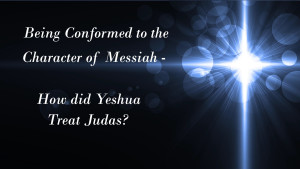 If you don’t want to be seriously challenged then I suggest not reading this because this is not easy material. It isn’t the sort of thing that you can respond to with “Yeah, but..”
If you don’t want to be seriously challenged then I suggest not reading this because this is not easy material. It isn’t the sort of thing that you can respond to with “Yeah, but..”
We are supposed to be conformed to the image of Messiah, which means coming to grips with the fact that He only overturned tables and made a whip twice (and then only within the confines of the Temple where criminal activities were being perpetrated by the Roman appointed High Priest), He saved His rebukes for people who were either actually criminals (like the Sadducees) or who were actively trying to shame Him in honor contests – and He walked side by side with a man, who He knew was going to sell Him out and betray Him, for the entire duration of His ministry and treated him so normally that no one suspected a thing. Ouch.
No one suspected a thing about Judas. Yeshua knew, of course, because He knew the hearts of all men. He chose him, knowing his heart. We walked with him, knowing his heart. He ate with him, taught him, slept alongside him, laughed with him and cried with him.
Yeshua understood the reality of Covenants – and Covenants don’t give us the right to be treacherous to those who have been or will be treacherous to us. Covenants are about loyalty to those with whom we are in Covenant, regardless of their character. It doesn’t mean closeness and intimate relationship, and in fact people who have proven treacherous need to be kept at arm’s length, but we cannot respond to untrustworthiness with being untrustworthy ourselves. We can’t fight the fruit of the evil one with more of his own fruit – we have to respond with the fruit of the Spirit and nothing is harder.
Nothing seems less righteous and less honorable.
There are sometimes some very important lessons to be learned in the myths of ancient cultures and one of the most common is the tale of an Oracle giving someone a prophecy that such and such a person would destroy them. So the recipient of the oracle goes out and preemptively tries to destroy that currently innocent person, setting in motion the very chain of events that eventually leads to their own destruction. Funny how that works, eh?
Yeshua could have outed Judas as a thief, a liar, and a treacherous dog – but He didn’t. Yeshua treated Him according to the innocence of His own heart – He gave Judas no reason for betrayal. He also, in responding to the betrayal, didn’t call for revenge and resort to name-calling. Yeshua showed Himself the most innocent of the charges in that, once betrayed, He didn’t retaliate. Not retaliating is hard, living side by side with someone who you know will or might someday betray you is difficult – excruciatingly so.
We live in a world, especially a religious world, where betrayal is sadly the norm. People think nothing about tearing each other apart, undermining each other, and bringing shame on our God in so doing. Everyone who calls upon Messiah and believes that the God of Abraham, Isaac and Jacob’s actual begotten Son came in the flesh and dwelt among us, was crucified and was raised from the dead – anyone that foolish in the eyes of the world is in Covenant together with every other person who believes that. We are joined together by the King of kings and yet we treat each other largely like dogs, and worse than dogs – scoffing and mocking and engaging in the worst kinds of public and private character assassination. Often over nothing, and generally because of our own fears and lack of trust in God, ambition, need for approval, over a misunderstanding, or simple offense.
And yet look how patient God is with us even as we engage in this shameful behavior – not even treating us as we deserve, not preemptively punishing us for what He sees in our hearts.
Covenant means that we are all connected, every single believer according to the current level of revelation of each individual. Covenant means that how we treat each other is actually how we are treating our mutual Master. In the ancient world, if you messed with a man in Covenant, you were messing with absolutely everyone whom that man was in Covenant with. People were a lot more cautious with their mouths and actions, realizing that what they did and said reflected not only on themselves but upon their God and their clan. Nowadays, in our individualistic (and therefore to varying degrees narcissistic) world view, we really don’t consider the global or even the local impact of our words of actions – we are blind to the way they effect anyone but ourselves. The Bible wasn’t written to people like us, and so when we read the words and try and speak them as individuals, they don’t carry the same meaning.
We are all connected, and therefore we all have to be entirely innocent and full of good fruit in our dealings with each other. It is easy to not be loving, joyful, peaceful, patient, kind, good, gentle, faithful and self-controlled and simply call it zeal but zeal has never been an excuse for bad fruit.
Yeshua didn’t treat Judas as Judas deserved to be treated. Yeshua dealt with Judas according to the content of His own character, not Judas’ character. He does the same with us, walking with us, teaching us, dealing with us in long-suffering kindness – oh my goodness how can we justify doing any less?
Had a dream in December that I would be dealt with treacherously and by the time I woke up it had already happened. I spent the next two months struggling, hurting, and wanting revenge. Life was an agony in so many ways, so much hurt dredged up as I dealt with the consequences of someone else’s publicly vented frustration and wanting so badly to respond in kind, really still wanting to because treachery is contagious (all of the works of the enemy are infectious). Just as I finally began to come to terms with it, yesterday morning I had a dream that it is about to happen again, a different person this time. As far as I know it hasn’t happened yet, and I am left with only the example of Yeshua vs all those ancient myths. Do I behave as Yeshua and treat him like Yeshua treated Judas, or do I provoke the treachery by punishing him for something he hasn’t even done yet?
I am appreciating the character of our Master now in new and painful ways. He walked side by side with His betrayer, who would all but place Him on the cross. His loving character is beyond overwhelming, and it is, frankly, shaming me in how far I fall short of it.
You know what? Bad things happen to “good” people but more than that, bad things happen to all us normal people too, and it happens so that, if we are willing, it can transform us little by little into the image of our Messiah.


